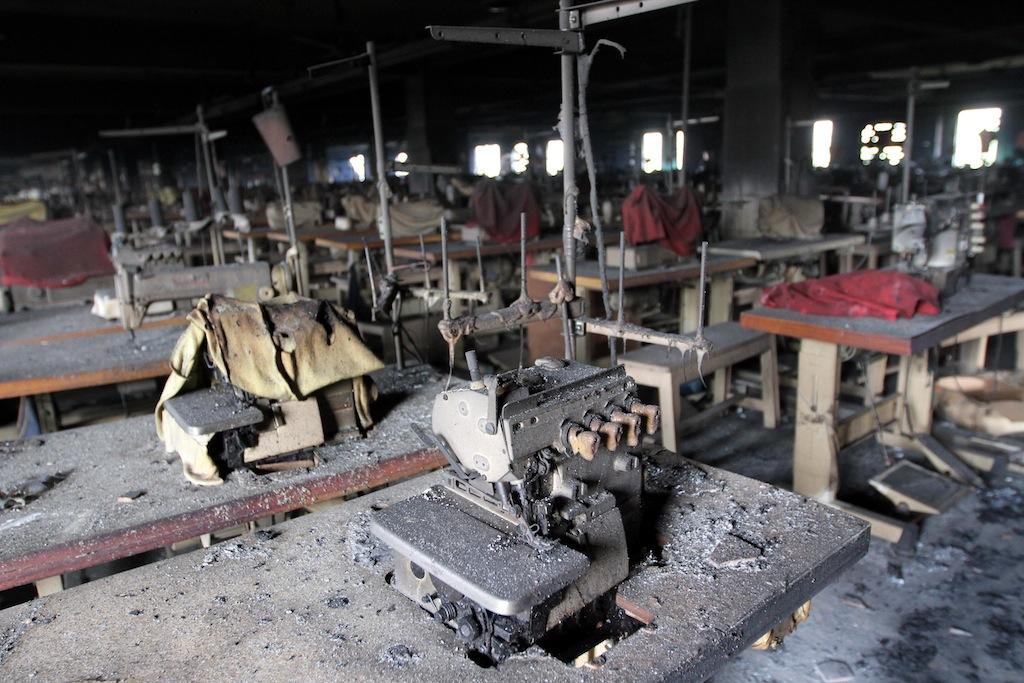US retailers again eye safety standards after deadly Bangladesh fire
The skeletal remains of rows of sewing machine tables, covered in ash after a fire at the Tazreen Fashions factory outside Dhaka, Bangladesh.
On this national day of mourning in Bangladesh, the country is coming to terms with a devastating factory fire that killed 112 people at the Tazreen Fashions factory outside Dhaka last weekend.
It is the latest in a series of deadly fires in one of the world's leading clothing exporters to major Western retailers like Gap, Tommy Hilfiger and Walmart. Labor rights activists say over 600 people have been killed in six years because of lax fire codes and inattention by bosses to safety standards.
The American fashion industry has done little to get involved in improving manufacturing standards in Bangladesh, despite the fact that fires and badly managed factories where workers make an average of 21 cents an hour violate international labor and safety laws.
Tommy Hilfiger, after a fire broke out in one of the factories used to make their clothes in 2010, pledged a measly $1 million to safety efforts.
Walmart has distanced itself from this week's fire, according to a statement released yesterday, and said Tazreen Fashions was no longer authorized to produce clothing for it. The company insisted that a Walmart supplier had subcontracted Tazreen "in direct violation of our policies," reported the Christian Science Monitor.
More from GlobalPost: Bangladesh's garment workers brave deadly fires to make luxury American clothing
A Walmart representative said, "Today, we have terminated the relationship with that supplier. The fact that this occurred is extremely troubling to us, and we will continue to work across the apparel industry to improve fire safety education and training in Bangladesh."
Walmart has not, however, been actively involved in enforcing fire safety. The opposite is true, actually, according to labor rights advocates.
Scott Nova, executive director of the labor monitoring group Workers Rights Consortium told the Nation this week, "Walmart is supporting, is incentivizing, an industry strategy in Bangladesh: extreme low wages, non-existent regulation, brutal suppression of any attempt by workers to act collectively to improve wages and conditions."
“This factory is a product of that strategy that Walmart invites, supports, and perpetuates,” he said.
Walmart is the second largest buyer of garments from Bangladesh after H&M, according to the International Labor Rights Forum, which has been working to implement a binding fire safety agreement between the factories, the retailers, and labor groups.
"The program, which would be financed by participating companies, proposes an independent oversight committee, including representatives of unions and the apparel industry, would select a fire inspection chief," reported the Wall Street Journal. "That person would inspect participating factories and make binding recommendations. Workers would get safety training."
More from GlobalPost: Working conditions in Bangladesh worry US importers
Other retailers, like Gap, have opted to instill their own fire safety programs instead. Gap has given $20 million to safety efforts and has met with the government of Bangladesh, the Bangladesh Garment Manufacturers and Exporters Association, and the UN's International Labor Organization, on safety procedures, according to a release in September.
This week, on the heels of yet another fire, Gap announced its new plan:
In Bangladesh, we are implementing our 4-part Fire Safety Action Plan to improve the safety at the factories that do business with our company. This includes assembling a dedicated fire safety team based in Bangladesh, South Asia, and the United States. This newly designated team will be responsible for the implementation of the fire and building safety program and includes the appointment of an independent Chief Fire Safety Inspector We have designed the overall organizational structure of the program, as well as dedicated the appropriate financial resources and people necessary to effectively manage and implement the program.
However, the International Labor Rights Forum says Gap's program isn't good enough.
“Unfortunately, Gap Inc. withdrew last month from fire safety discussions [with labor and other retailers] and instead announced their own non-binding program, which lacks central elements of the fire safety program signed by PVH and Tchibo,” said Judy Gearhart, executive director of International Labor Rights Forum, in a post on their site. “We hope the tragic fire at Tazreen will serve as an urgent call to action for all major brands that rely on Bangladesh’s low wages to make a profit. Their voluntary and confidential monitoring programs have failed; now it is time to come together and make a contractual commitment to workers and to involve workers and their organizations in the solution.”
For more coverage of Bangladesh's garment industry and other labor issues, check out our Special Report "Worked Over: The Global Decline in Labor Rights."
Our coverage reaches millions each week, but only a small fraction of listeners contribute to sustain our program. We still need 224 more people to donate $100 or $10/monthly to unlock our $67,000 match. Will you help us get there today?
